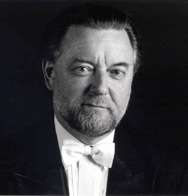|
Back
Davies, Hough, and the OSM Deliver Montréal
Salle Wilfrid-Pelletier, Place des Arts
02/23/2011 - & February 24*, 2011
Pierre Mercure: Lignes et points
Sergei Rachmaninoff: Rhapsody on a Theme of Paganini op. 43
Sergei Prokofiev: Cinderella, Suite from the ballet
Stephen Hough (Piano)
Orchestre Symphonique de Montréal, Sir Andrew Davis (Conductor)

Sir A. Davis (Courtesy of OSM)
Last week’s concerts by the Orchestre symphonique de Montréal (OSM) were held in collaboration with the fifth edition of the Montréal/New Music Festival, locally known as the M/NM Festival. The OSM wished to highlight the 50th anniversary of Quebec’s first major contemporary music event, the Semaine internationale de musique actuelle. The work chosen to mark this anniversary, Lignes et points, was written for this event in 1963-64 by Pierre Mercure (1927-1966), one of Canada’s new music pioneers. A series of eight variations on a single theme, according to the composer, “seeks a new form of fusion of … two sound materials” (electronic and traditional music). “But…there are no electronic sounds properly so-called. It’s more a question of obtaining from the regular instruments in a symphony orchestra a coloration of timbres and attacks, evoking those that the ‘music for tape’ has made familiar to us.”
Mercure succeeded admirably with the 13-minute work. The variations, played without interruption, run the gamut of instrumental color, timbre and possibilities. The sounds evoked included brash, whimsical, funny, cacophonic and melancholic. At times, it was difficult to realize that traditional instruments were at play, so convincingly did the orchestra portray electronic sounds. The brilliant brass fired off staccato notes, the strings produced lonesome whisperings and the expanded percussion section performed with impressive precision. The work sounded fresh and contemporary, as if it had been written this year.
The second work on the program was also a set of variations. Rachmaninoff was inspired by Paganini’s 24th Caprice for solo violin to create his Rhapsody on a Theme of Paganini, his last work for soloist and orchestra. Stephen Hough delivered an elegant, articulate and nuanced performance. The slow variations were poetic and introspective and the fast ones, including the ecstatic finish, exuded clarity and control without relinquishing power. Guest conductor Sir Andrew Davis, of whom, up to now, I had never been a fan, conducted with an even hand and drew solid support from the OSM. There was no question of unequal partnership in this collaboration.
For the second half of the concert, Davis chose 12 numbers from the three suites that Prokofiev adapted from his ballet Cinderella. For the occasion, Davis composed a light-hearted poem outlining the Cinderella story which he read before the orchestral introduction. He then introduced each musical segment with a short synopsis, again in poetic format, with such gems as “The Prince is thrilled to bits!”.
The orchestral playing was superb throughout. Davis and the OSM understand each other perfectly and they performed together splendidly. Highlights included the lush carpet of sound in the “Introduction”; the jaunty, lustful raciness of the “Quarrel”; the illusion of neighing horses in “Cinderella Goes to the Ball”; and the trance-like swing of “Cinderella’s Waltz”. Apart from an ugly horn blat at the beginning of “Fairy Godmother and Fairy Winter”, the brass playing was breathtaking. A special nod to tubist solo Dennis Miller, who played consistently with warmth and golden resonance. Davis conducted with an economy of gesture and precision that showcased the OSM’s skills better than the recent performance of Bartók’s Concerto for Orchestra. Let’s hope for more visits from this maestro!
Earl Arthur Love
|